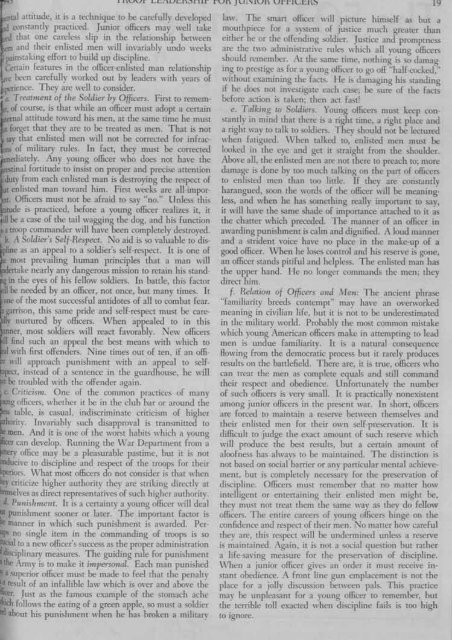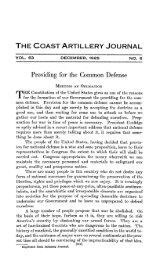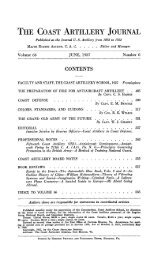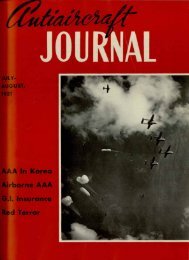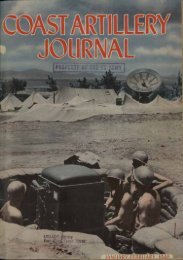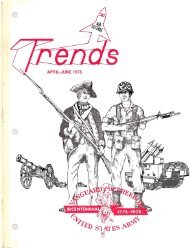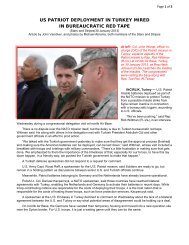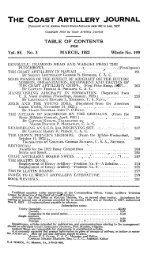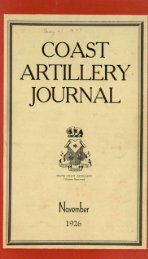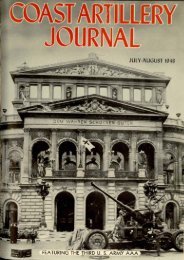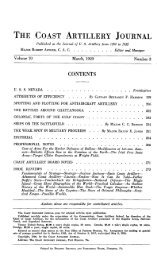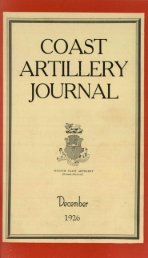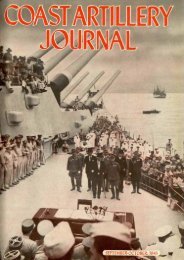July-August - Air Defense Artillery School
July-August - Air Defense Artillery School
July-August - Air Defense Artillery School
You also want an ePaper? Increase the reach of your titles
YUMPU automatically turns print PDFs into web optimized ePapers that Google loves.
nlal allirude. it is a lechnique to be carefully developed<br />
constantly practiced. Junior officers may well take<br />
that one careless slip in the relationship between<br />
m and their enlisted men will im'ariablv undo weeks<br />
painstaking effort to build up discipline ..<br />
Certain features in the officer-enlisted man relationship<br />
Ie been carefully worked out by leaders with years of<br />
tperience. They are well to consider.<br />
• I. T remment of tile Soldier by Ofl1cers. First to remem-<br />
. of course, is that while an officer must adopt a certain<br />
lemal attitude toward his men, at the same time he must<br />
forget that they are to be treated as men. That is not<br />
sa\' that enlisted men will not be corrected for infracns'<br />
of military rules. In fact, they must be corrected<br />
ecliately. Any young officer who does not have the<br />
1e5linal fortitude to insist on proper and precise attention<br />
dut)' from each enlisted man is destroying the respect of<br />
I enlisted man toward him. First weeks are all-impor-<br />
I. Officers must not be afraid to say "no." Unless this<br />
ilucle is practiced, before a young officer realizes it, il<br />
pill be a case of the tail wagging the dog, and his function<br />
a Iroop commander will have been completely destroyed.<br />
b. A Soldier's Self-Respect. No aid is so valuable to dis-<br />
Iine as an appeal to a soldier's self-respect. It is one of<br />
most prevailing human principles that a man will<br />
dertake nearly any dangerous mission to retain his stand-<br />
Igin the eyes of his fellow soldiers. In battle, this factor<br />
IIbe needed by an officer, not once, but many times. It<br />
one of the most successful antidotes of all to combat fear.<br />
garrison, this same pride and self-respect must be carely<br />
nurtured by officers. ,",Vhen appealed to in this<br />
nner, most soldiers will react favorably. New officers<br />
'11find such an appeal the best means with which to<br />
I with first offenders. Nine times out of ten, if an offiwill<br />
approach punishment with an appeal to selfpect,<br />
instead of a sentence in the guardhouse, he will<br />
t be troubled with the offender again.<br />
c. Criticism. One of the common practices of many<br />
ng officers, whether it be in the club bar or around the<br />
table, is casual. indiscriminate criticism of higher<br />
hority. Invariably such disapproval is transmitted to<br />
men. And it is one of the worst habits which a young<br />
cer can develop. Running the \Var Department from a<br />
tery office may be a pleasurable pastime, but it is not<br />
Onduciveto discipline and respect of the troops for their<br />
periors. What most officers do not consider is that when<br />
ey criticize higher authority they are striking directly at<br />
emselvesas direct representatives of such higher authority.<br />
d. Punishment. It is a certainty a young officer will deal<br />
ilt punishment sooner or later. The important factor is<br />
e manner in which such punishment is awarded. Perps<br />
no single item in the commanding of troops is so<br />
cial to a new officer's success as the proper administration<br />
disciplinary measures. The guiding rule for punishment<br />
the Army is to make it impersonal. Each man punished<br />
a superior officer must be made to feel that the penalty<br />
a result of an infallible law which is over and above the<br />
licer. Just as the famous example of the stomach ache<br />
bichfollows the eating of a green apple, so must a soldier<br />
tl about his punishment when he has broken a military<br />
i nVVi LLLUJLl\.:l1111' 1Un J U.'dVh VrrlL..t:.K~ l~<br />
law. The smart officer will picture himself as but a<br />
mouthpiece for a system of justice much greater than<br />
either he or the offending soldier. Justice and promptness<br />
are the two administrative rules which all vouno officers<br />
. ,:,<br />
should remember. At the same time. nothino is so damao-<br />
. ,:, ,:,<br />
ing to prestige as for a young oflicer to go off "half-cocked,"<br />
without examining the facts. He is damaging his standing<br />
if he does not investigate each case; be sure of the facts<br />
before action is taken; then act fast!<br />
e. Talkillg to Soldiers. Young officers must keep constantly<br />
in mind that there is a right time, a right place and<br />
a right way to talk to soldiers. They should not be lectured<br />
when fatigued. \\'hen talked to, enlisted men must be<br />
looked in the eye and get it straight from the shoulder.<br />
Above all, the enlisted men are not there to preach to; more<br />
damage is done by too much talking on the part of officers<br />
to enlisted men than too little. If they are constantly<br />
harangued, soon the words of the officer will be meaningless,<br />
and when he has something really important to say,<br />
it will have the same shade of importance attached to it as<br />
the chatter which preceded. The manner of an officer in<br />
awarding punishment is calm and dignified. A loud manner<br />
and a strident voice have no place in the make-up of a<br />
good officer. \iVhen he loses control and his reserve is gone,<br />
an officer stands pitiful and helpless. The enlisted man has<br />
the upper hand. He no longer commands the men; they<br />
direct him.<br />
f. Relation of Ofl1cers alld Mell: The ancient phrase<br />
"familiarity breeds contempt" may have an overworked<br />
meaning in civilian life, but it is not to be underestimated<br />
in the military world. Probably the most common mistake<br />
which young American officers make in attempting to lead<br />
men is undue familiarity. It is a natural consequence<br />
flowing from the democratic process but it rarely produces<br />
results on the battlefield. There are, it is true, officers who<br />
can treat the men as complete equals and still command<br />
their respect and obedience. Unfortunately the number<br />
of such officers is very small. It is practically nonexistent<br />
among junior officers in the present war. In short, officers<br />
are forced to maintain a reserve between themselves and<br />
their enlisted men for their own self-preservation. It is<br />
difficult to judge the exact amount of such reserve which<br />
will produce the best results, but a certain amount of<br />
aloofness has alwavs to be maintained. The distinction is<br />
not based on socia(barrier or any particular mental achievement,<br />
but is completely necessary for the preservation of<br />
discipline. Officers must remember that no matter how<br />
intelligent or entertaining their enlisted men might be,<br />
they must not treat them the same way as they do fellow<br />
officers. The entire careers of young officers hinge on the<br />
confidence and respect of their men. No matter how careful<br />
they are, this respect will be undermined unless a reserve<br />
is maintained. Again, it is not a social question but rather<br />
a life-saving measure for the preservation of discipline.<br />
\"hen a junior officer gives an order it must receive instant<br />
obedience. A front line gun emplacement is not the<br />
place for a jolly discussion between pals. This practice<br />
may be unpleasant for a young officer to remember, but<br />
the terrible toll exacted when discipline fails is too high<br />
to ignore.


